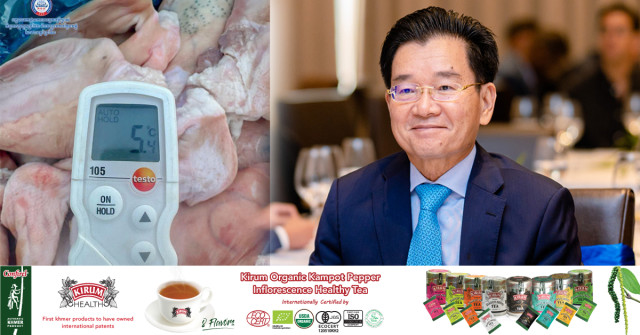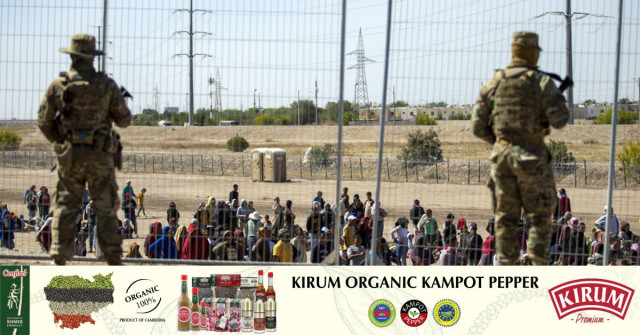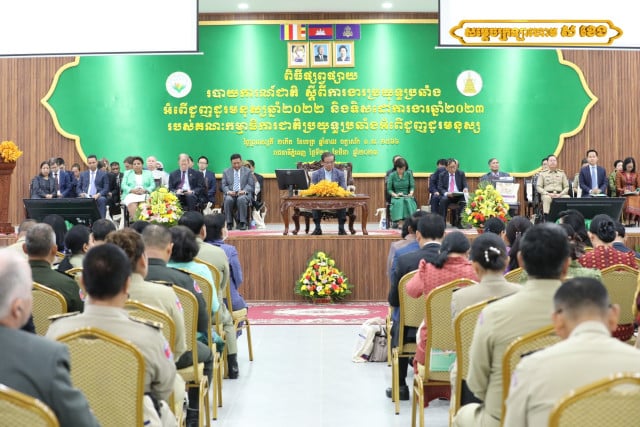Customs Chief Rules Out Frozen Meat Ban

- By Chhum Chantha
- December 27, 2023 4:15 PM
PHNOM PENH – Customs will continue to crack down on illegal and substandard meat but cannot ban the import of legal frozen products because of free-trade rules, says customs chief Kun Nhem.
He was responding to requests from the private sector to suspend the import of frozen meat for a while to help the local livestock sector.
Kun Nhem, director-general of the Department of Customs and Excise, said Customs had in the past allowed the import of frozen meat to meet the needs of the domestic market and especially to prevent meat inflation.
Local livestock farmers have long said that the imports hurt local businesses.
Kun Nhem said local farmers consider only the interests of their businesses but the government needs to consider consumers and businesses. If there is insufficient livestock or no production, imports must be allowed.
Frozen meat is imported from India, Brazil, Australia, the US and Japan. This meat is also for restaurants and hotels. Each year, Cambodia needs between 290,000 and 300,000 tonnes of meat from other countries to supply the market, according to the Ministry of Agriculture, Forestry and Fisheries.
The customs chief said that imports of frozen meat are traded freely in line with rules set out in the World Trade Organization (WTO) agreement.
Cambodia cannot issue a ban because it is a matter of trade between each country and the government has to weigh it carefully before launching each measure.
“They export to us. We also export to them. If they ban ours, it could turn into a trade dispute. So, sometimes it takes a lot of balance before each measure is issued,” he said.
He said Cambodia had decided to adjust the conditions for importing some frozen meat to facilitate management and ensure the quality.
Kun Nhem said the importers must have cold storage and specify their business to facilitate import management.
Sub-decree No. 17 states that imported frozen meat can only be obtained with animal health certificates or meat issued by the exporting country.
But from May, all meat imports will also require a permit from the Ministry of Agriculture. Customs are urging importers to use the one window system to facilitate faster application of permits.
Srun Pov, president of the Cambodian livestock breeder’s association, said that he was not satisfied with the policy and disagree with Kun Nhem’s explanation.
Pov said a ban on imported frozen meat for some period is needed to strengthen markets and prices in the country.
He said that even though the amended sub-decree 17 will come into force in May, it is expected that local farmers will still not be able to withstand the losses as frozen meat flows in and local meat remains over-supplied.
“From today for the next five months, what can our farmers expect if the frozen meat is full in the warehouse and imported meat is flowing in,” he said.
Kun Nhem said that the frozen meat imported to Cambodia is all legal and of good quality.
However, Srun Pov, said he went to inspect some warehouses and found that some of the meat was out of date, damaged, and some had a mixture of chemicals.
Kun Nhem said people took the opportunity import illegal meat. He spoke of cracking down on illegal and substandard meat products.
However, Pov did not seem to have faith in the crackdown. When he inspected some warehouses, he saw some of the meat was out of date, some was defective and some was mixed with chemicals.
Srun Pov said he did not expect lower-level officials to resolve the issue of frozen meat, calling on PM Hun Manet to intervene.
Originally written in Khmer for ThmeyThmey, this article was translated by Nhor Sokhoeurn for Cambodianess.















